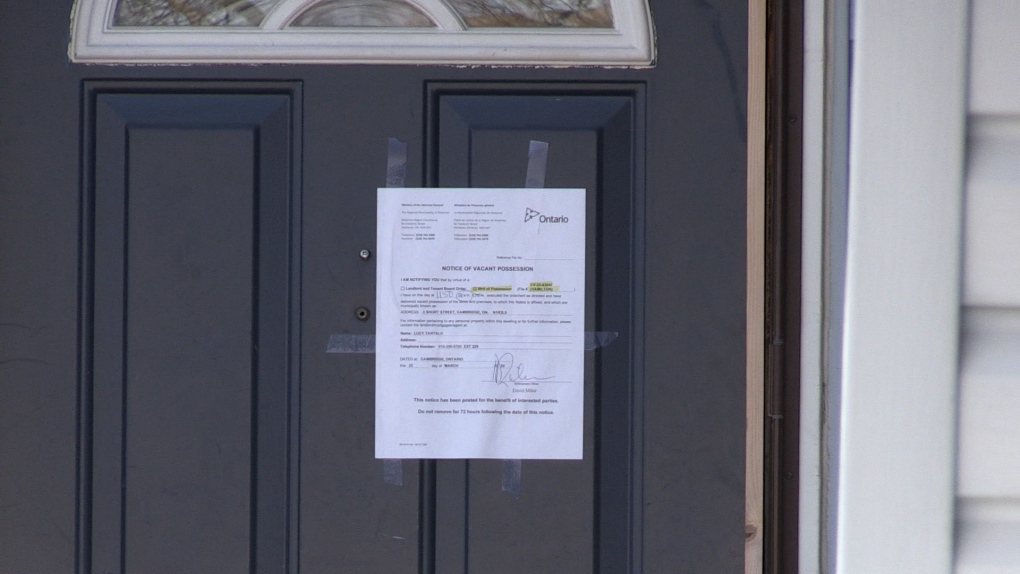Evicted family given access to home, contemplating legal action
CTV News recently spoke to a family in Cambridge who were evicted from their rental home after their landlord appeared to have lost possession of the property.
The Gray family has been going from home to home since being forced out but are now staying at a friend’s house in Paris, which they plan to officially rent.
“Rent [is] significantly less than I was paying at the other place,” Rebecca Gray explained. “And I actually known this person for years and can trust this person, so we feel very comfortable.”
Gray said she was allowed back into the rental home Tuesday, so she could grab her glucose monitor and some her kids’ stuff, and the property management company has indicated they will let her back inside, under supervision, sometime next week to start packing. Moving day is currently set for April 6.
 Rebecca Gray shows the texts she exchanged with her former landlord on the day she was evicted. (Colton Wiens/CTV Kitchener)
Rebecca Gray shows the texts she exchanged with her former landlord on the day she was evicted. (Colton Wiens/CTV Kitchener)
Gray said the ordeal has been tough on her whole family, especially the kids. One of her daughters was in an enrichment program at her school in Cambridge, but she’s had to change schools because of the eviction.
"They want to have a place to stay. My daughter's teacher, he's her biggest advocate. He got her into that enrichment program. He said: ‘I am going to make sure that she's getting into an enrichment program in Paris,’" Gray added.
 Rebecca Gray moved into the Short Street home on Jan. 15 after signing a 12-month lease. Court documents show the landlord lost possession of the home four days later. (Colton Wiens/CTV Kitchener)
Rebecca Gray moved into the Short Street home on Jan. 15 after signing a 12-month lease. Court documents show the landlord lost possession of the home four days later. (Colton Wiens/CTV Kitchener)
Legal grounds
A partner at DC Paralegals LLP in Cambridge said there is not a lot Gray could have done to protect herself in this situation.
"There's no central registry or a licensing regime for landlords, and it's not really as if tenants are going to go around demanding title documents from people that they intend to rent from," explained Barret Beaudoin, a partner at DC Paralegals LLP.
Taking legal action, he added, could be complex in this case.
Beaudoin said Gray may be able to file an application to the Landlord and Rental Tenant Board to collect any prepaid rent, like her last month’s deposit.
"But there isn't really anything in the Residential Tenancies Act that targets this type of a situation. The other option, or the other way that you could look at this file, is that it's a strict breach of contract, which would require her to go to the small claims court, assuming that the damages are less than $35,000," Beaudoin explained.
He said legislation could be introduced to avoid similar situations in the future, but that could also create other gaps in the law.
"With the housing market the way that it is now and the ever changing circumstances that you have with the types of tenancies that are forming, it's a little hard to create legislation that predicts future circumstances."
Gray said she is not sure whether she will pursue legal action, but is speaking with experts about the possibility.
 A notice on the door of Rebecca Gray's former rental home is pictured on March 25, 2024. (Colton Wiens/CTV Kitchener)
A notice on the door of Rebecca Gray's former rental home is pictured on March 25, 2024. (Colton Wiens/CTV Kitchener)
Response from the ministry
The Ministry of Municipal Affairs and Housing sent the following statement to CTV News: ““Under the Residential Tenancies Act (RTA), every tenant facing eviction has the right to a hearing at the Landlord and Tenant Board (LTB). If a landlord gives a tenant notice to end the tenancy, the tenant does not have to move out unless and until an eviction order is issued by an adjudicator. To preserve the tribunal’s independence, neither the Minister of Municipal Affairs and Housing nor government officials are permitted to interfere in, or comment on, tribunal processes, cases or decisions. The ministry is not in a position to comment or provide legal interpretation on whether the RTA would apply to an individual’s circumstances and whether the lease arrangement is valid.”
The statement continued: “In most cases, where a lender takes over a tenanted property, they assume the responsibilities of the landlord and must follow the rules under RTA to evict a tenant. However, there are some limited situations where a court may set aside a tenancy agreement. If a tenant has a dispute with a landlord that may involve an offence under the Act, they can contact the Rental Housing Enforcement Unit (RHEU).”
CTVNews.ca Top Stories

Trudeau talks border, trade in surprise dinner with Trump at Mar-a-Lago
Prime Minister Justin Trudeau discussed border security and trade during a surprise dinner with U.S.-president elect Donald Trump at Mar-a-Lago in West Palm Beach, Fla. on Friday evening, according to senior government sources.
Man who died trying to help stranded motorist identified as Khalid Farooq, father of 5
The man who lost his life trying to help a stranded motorist Wednesday has been identified as Khalid Farooq.
W5 Investigates 'I never took part in beheadings': Canadian ISIS sniper has warning about future of terror group
An admitted Canadian ISIS sniper held in one of northeast Syria’s highest-security prisons has issued a stark warning about the potential resurgence of the terror group.
Are scented candles bad for you? What the science says
Concerns about the safety of candles are rooted in the chemical reactions that occur when you burn them, as well as in the artificial fragrances and colorants that contribute to the various scents you may love.
It's time for a good movie this holiday season, here's what's new in theatres
This holiday season has a special edition at the theatres with movies "that everyone has been waiting for," says a movie expert from Ottawa.
Poilievre suggests Trudeau is too weak to engage with Trump, Ford won't go there
While federal Conservative Leader Pierre Poilievre has taken aim at Prime Minister Justin Trudeau this week, calling him too 'weak' to engage with U.S. president-elect Donald Trump, Ontario Premier Doug Ford declined to echo the characterization in an exclusive Canadian broadcast interview set to air this Sunday on CTV's Question Period.
Emboldened 'manosphere' accelerates threats and demeaning language toward women after U.S. election
An emboldened “manosphere” has seized on Republican Donald Trump ’s presidential win to justify misogynistic derision and threats online.
Montreal researchers make breakthrough discovery in fighting HIV
Researchers in Montreal have made a breakthrough discovery in HIV research by finding a way to expel the virus from its hiding places and destroy it.
Cucumbers sold in Ontario, other provinces recalled over possible salmonella contamination
A U.S. company is recalling cucumbers sold in Ontario and other Canadian provinces due to possible salmonella contamination.
































